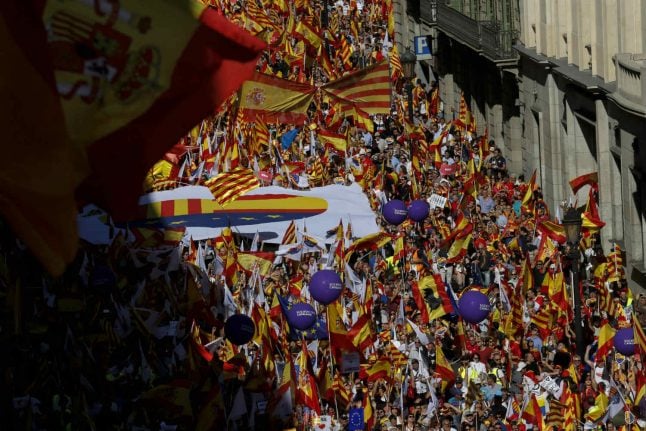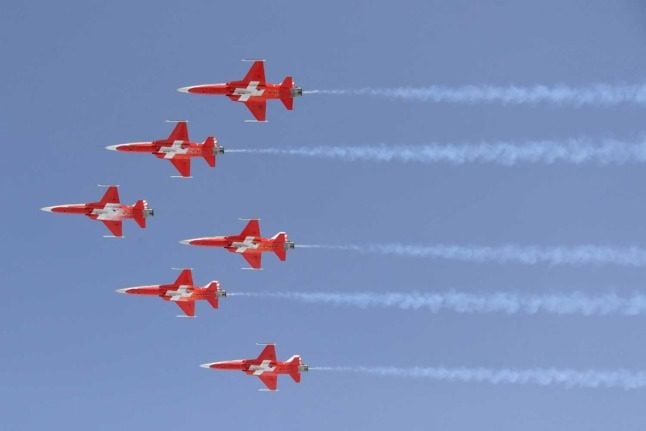Hundreds of thousands of flag-waving demonstrators packed central Barcelona on Sunday to rally against plans by separatist leaders to declare Catalonia independent following a banned secession referendum.
Catalans calling themselves a “silent majority” opposed to leaving Spain broke their silence after a week of mounting anxiety over the country's worst political crisis in a generation.
The crowd waved both Spanish and Catalan flags and chanted “Viva España! Viva Catalonia!” as they made their way through the streets of Barcelona under a clear blue sky.
“We have perhaps been silent too long,” Alejandro Marcos, 44, told AFP.
“It seems that the one who yells the most wins the argument. So we have to raise our voices and say loud and clear that we do not want independence.”
Around 350,000 people attended the rally, municipal police said, while organisers put turnout at between 930,000 and 950,000.
Some protesters called for the region's separatist president Carles Puigdemont to go to jail for holding a vote on independence in defiance of the Spanish government and courts.
“The unity of Spain cannot be voted on or negotiated — it must be defended,” read one sign in the crowd.
Others called for dialogue. The slogan for the demonstration — organised by the Societat Civil Catalana, the main anti-independence group in Catalonia — was: “Enough, let's recover good sense!”
Recent polls had indicated that Catalans are split on independence, though leaders said the violence during the referendum turned many against the state authorities.
On the eve of the rally, Spain's Prime Minister Mariano Rajoy issued a stern warning to Catalan leaders who have said they could declare independence this week.
He did not rule out suspending Catalonia's regional autonomy — a move that could risk sparking unrest.
“I rule out absolutely nothing that is allowed for under the law,” he said in an interview published in El Pais newspaper.
“The ideal would be not to have to take drastic measures,” he said.
“I would like this threat of a declaration of independence to be withdrawn as quickly as possible.”
Sunday's rally came exactly one week after the contested vote that has triggered Spain's worst political crisis in a generation.
READ ALSO:
- Catalonia could declare independence on Monday
- What happens next in Catalonia?
- Spain's constitutional court suspends key Catalan parliament session
On Saturday tens of thousands of demonstrators, many dressed in white, hit the streets of Madrid and other cities across Spain to demand dialogue to end the dispute.
Tensions soared after police cracked down on voters during the banned October 1st independence referendum, prompting separatist leaders to warn they would unilaterally declare independence in days.
Tentative signs emerged Friday that the two sides may be seeking to defuse the crisis after Madrid offered a first apology to Catalans injured by police during the vote.
But uncertainty still haunts the country as Catalan leaders have not backed off from plans to declare the region independent.
Puigdemont is scheduled to address the regional parliament on Tuesday evening.
It remains unclear what he plans to say, although some separatist leaders hope he will use the opportunity to make a declaration of independence.
Rajoy in the interview assured Catalan leaders that there “is still time” to backtrack and avoid triggering a tough response from the central government in Madrid.
With its own language and cultural traditions, demands for independence in Catalonia date back centuries but have surged during recent years of economic difficulty.
Scenes of Spanish police beating unarmed voters in the October 1st referendum caused international shock.
Angelo Rossini Calvo, 38, said he planned to attend the protest in Barcelona because he felt the separatist lawmakers did not have a big enough majority in the Catalan parliament to justify the referendum.
“You can't call an important referendum like this, break a people and a country because you have one seat more,” the cabin crew instructor told AFP at his flat in central Barcelona on the eve of the demonstration.
The Catalan government on Friday published final results from the referendum indicating that 90 percent of voters backed the proposal to break away from Spain.
Turnout was 43 percent as Catalans who reject independence largely boycotted the polls,
The vote was not held according to official electoral standards, without a regular voter list, electoral commission or observers.
Dozens more protesters got off the morning train from Madrid at Barcelona's Sants station to join the protests on Sunday.
“A lot of ordinary Catalans felt under pressure so we decided to come and support our compatriots and show them that they are not alone,” said Juan Gil-Casares, 33, who works in Madrid and travelled up with his uncle and cousins.



 Please whitelist us to continue reading.
Please whitelist us to continue reading.